Loyal Nationals
In this short video, our Researcher Emma James shares five things to know about Loyal Nationals, and how they feel about climate change.
Who are Loyal Nationals?
(17% of the British public)
The second largest grouping (along with Disengaged Traditionalists, at 18%), they make up 35% of the total population. They feel angry and threatened, and take broadly ‘populist’ political views on a range of issues, leaning left economically (with anti-big business views, and favourability towards the redistribution of wealth), but right on social issues (having more authoritarian perspectives on governance, crime and punishment).
This is one of the oldest segments (second to Backbone Conservatives). They have a low or medium level of education, are the lowest earning, are the most likely to describe themselves as working class, and are second most likely to be of the lowest social grade (after Disengaged Battlers).
The table below highlights what an ideal UK looks like for this segment, as well as the issues that are most important to them, the messengers they trust, and their preferred news sources.
| Ideal UK | Most important issues (Feb) | Most important issues (Sept) | Trusted messengers | Most read news sources | |
|---|---|---|---|---|---|
| 1 | Hard-working | Healthcare and the NHS | Healthcare and the NHS | David Attenborough | BBC |
| 2 | Honest | Britain leaving the EU | The economy | Climate scientists | ITV |
| 3 | Compassionate | Crime | Britain leaving the EU | Ordinary people affected |
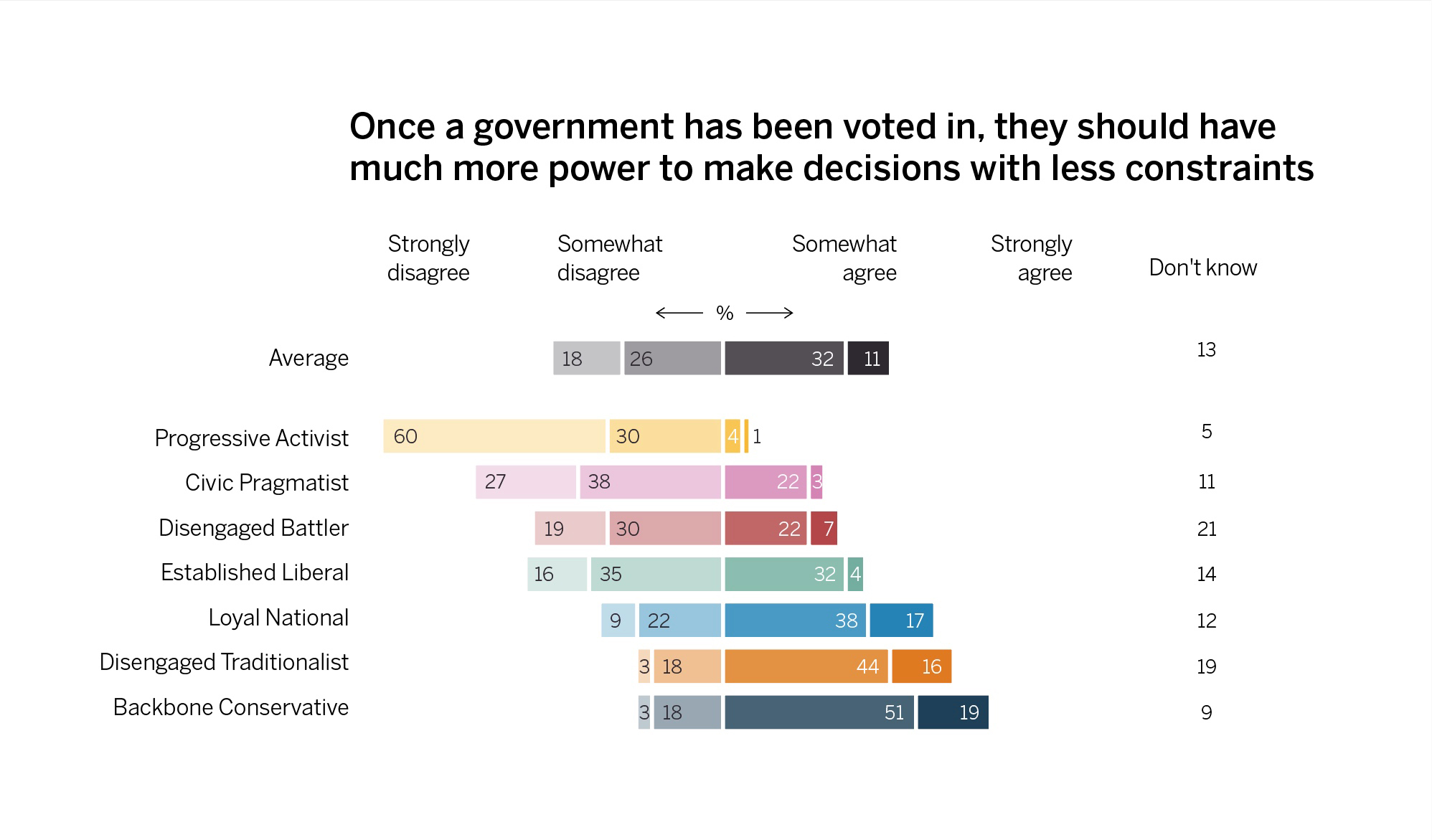
Loyal Nationals share an authoritarian stance on governance with other right-leaning segments
99% of Loyal Nationals agree that the world is becoming a more dangerous place, and this fear drives their political engagement. Loyal Nationals turn out to vote at general elections (85%, compared to 78% average) and local elections (69%, compared to 50% average). They tend to vote Conservative, although this rose significantly between the 2017 (43%) and 2019 general elections (51%), and a significant minority still vote Labour (28%).
They strongly support Brexit and, after Disengaged Traditionalists and Backbone Conservatives, tend to agree that once a government has been voted in, they should have much more power to make decisions with less constraints (54%). Loyal Nationals think the country is divided (67%), and are the most likely, just before Backbone Conservatives, to say that immigration is the cause of the deepest divisions in the UK (51%).
While they have a similar socio-economic profile to Disengaged Traditionalists, they are distinguished by the fact that they feel galvanised or threatened by something (rather than apathetic): namely, immigration. They are the most likely to say they feel like a stranger in my own country (62%) and to worry about becoming a minority in my own country (73%). They are the segment that is least likely to say that immigration has had a positive impact on the UK, at 38%, with 56% saying it’s had a negative impact, and they are the most likely to say that there is pressure to speak a certain way about subjects like immigration (91%). People in this segment agree that these days people seem to care more about immigrants than about British citizens (79%).

Loyal Nationals have a strong sense of victimhood relating to immigration
Racialism … throwing the racist card. Everybody. You look at somebody wrong and it’s, you know, is it my colour? Is it this? Is it that? Is it that? I think people walk around on eggshells. When they’re at work I think people can walk around in eggshells. You’re scared to even have the common joke … I have to really think hard about what I’m going to say.”
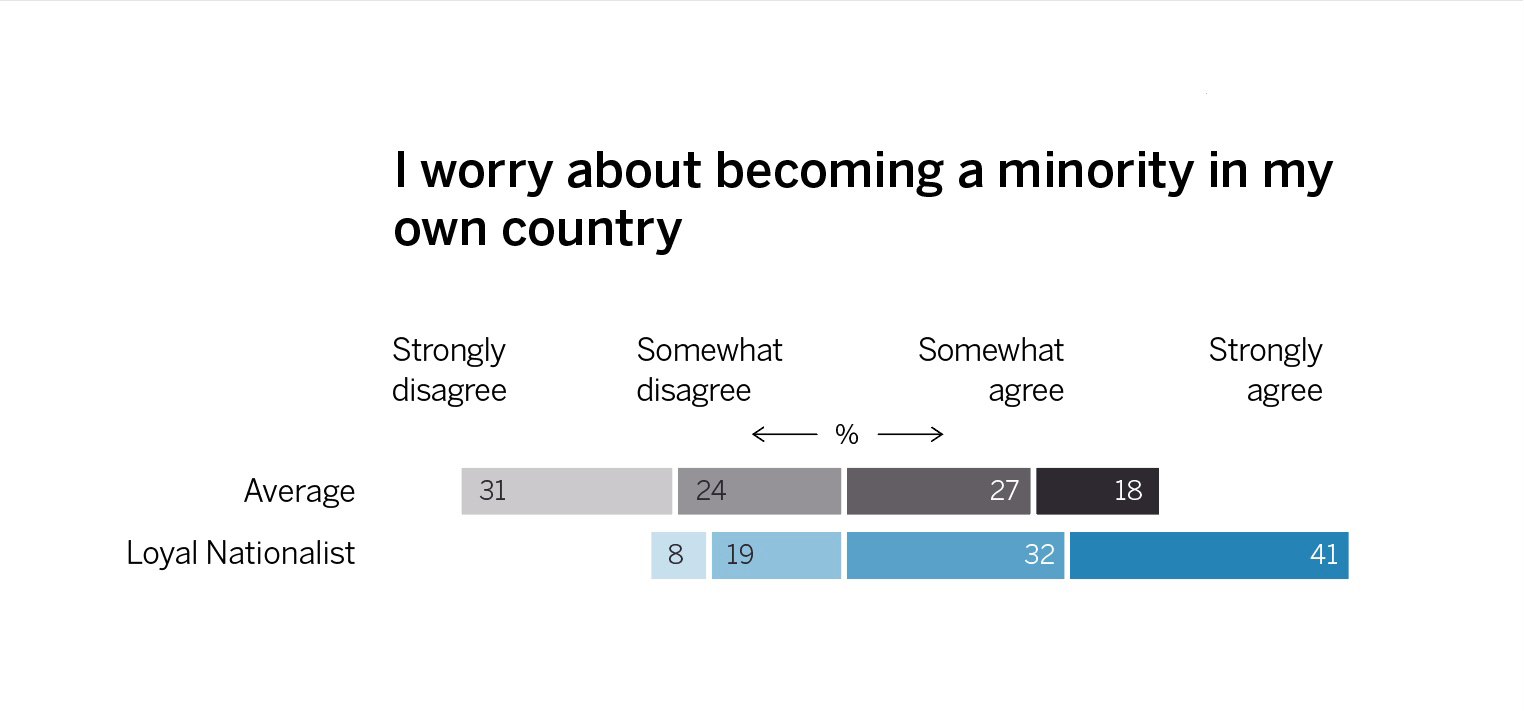
Loyal Nationals are worried about becoming a minority in Britain
I think there’s a big difference in generations. I’ve worked with a lot of people and the older generation were always willing to do things for themselves. Whereas now, literally people won’t even write their name on a form and expect you to fill it out for them. I think that’s a big difference.”
They are in almost universal agreement that younger people feel too entitled to an easy life (the highest of any segment, at 94%), and they tend to feel that politicians don’t care about people like me (79%). Almost all (96%) Loyal Nationals say that there is one law for the rich and one for the poor, with inequality seen as a serious, priority problem in the UK. They have the lowest trust and faith in people – 77% think we can’t count on the people around as much as we used to.
Loyal Nationals are the most fearful of any segment, strongly agreeing that the world is becoming a more and more dangerous place (99%, compared to 86% average), and believing that the area where I live is becoming a more and more dangerous place (66%, compared to 45% average). As a result, they are also particularly concerned about topics such as crime and terrorism.
Gone are the days where if you had a problem, you’d sort it out between you. Nowadays they’ve got to get all their friends with guns and knives and sort it out that way.”
I think discipline’s gone out the window.”
Despite the generally negative perspective on the state of the country, and a dominant, defining focus on the threat of immigration, this segment is most likely to say they are ‘very proud’ to be British, and Loyal Nationals generally see themselves in terms of their national identity.
What’s British?’ and it’s like, ‘British is all of us together as one, as far as I’m concerned’. So, I always say I’m British.”
Loyal Nationals from a BAME or mixed ethnic background (4%) share wider concerns about society becoming more dangerous, and have a more traditional, authoritarian stance on crime, but they may clash with the majority on issues of race and immigration. Below is an exchange between two Loyal Nationals:
If I have to use the word British, I’d say Black-British because it doesn’t feel right to call myself British full-stop or English … Maybe because I’m old enough to remember the National Front and for some reason I just associate British with the National Front, so I’ve got to say Black-British. I’ve got nothing against it, and I think there’s lots to be proud of, being British, but I can’t call myself British. Again, even though I was born here, and I’ve got the passport.”
You’re obviously entitled to define yourself in whichever way you choose. But having that mentality is like a German person not wanting to be called German because they don’t want to be referred to as a Nazi ... I’m just interested as to why you consider it difficult … the National Front rather than all of the other good things that Britain does.”
A high number (85%) have donated to charity in the past year. They see the ideal UK as hard-working, honest and compassionate – some communal values in amongst attributes like loyalty, tradition, politeness and a sense of national unity.
I can get on a high horse sometimes when I’m debating things with people, and I do like to go right and wrong, standards and behaviours, and things like that … I’ve got a strong sense of what’s right and wrong and morality, I would say.”
Loyal Nationals on climate change
Loyal Nationals express the third highest level of worry about climate change, rather than the elevated levels of climate scepticism that might have been expected (polls and studies consistently show higher levels of climate scepticism on the right of the political spectrum). Strikingly, 60% of Loyal Nationals are ‘extremely worried’ or ‘very worried’ about climate change. In fact, across a range of environmental issues – plastics, deforestation, air pollution and food waste – they are either the second or third most concerned segment.
This, along with the third highest agreement that we are already feeling the effects of climate change (69%) and the fourth highest (68%) belief that climate change is real and is caused by human action, places Loyal Nationals in a more progressive position than Established Liberals and Disengaged Battlers on some key measures. This underscores the value of the values-based segmentation approach taken in this project, which reveals differences between audiences that may not have been visible with a single-lens focus (e.g. left/right political spectrum).
However, despite being the third most likely segment to say they would sign a petition about climate change (17%), outranked only by Progressive Activists and Civic Pragmatists, they are very unlikely to vote based on climate policy (5%), and tend to agree that there’s no point in me trying to protect the environment because big companies and other countries will keep polluting. Their feelings of victimhood and a sense of injustice are likely to be driving this perspective, and more reactionary perspectives on personal action among this segment are likely to be common.
I don’t recycle or anything. I’m one of those people, I’m sorry. But I’m not really sorry. I don’t recycle but I also acknowledge that the environment is changing because I know when I was little, summers were proper summers and winter was proper winter. We didn’t have snow in March. It really was roasting in July. So, I know that the environment is changing. I think the reason I don’t recycle actually is because I’m just sick of hearing the word ‘recycle’ ... And I think sometimes the more somebody will say to me, ‘do this, do this, this is politically correct, blah, blah, blah’, I think you know what? No. No. I’m not going to wash out my milk carton. I’m just going to chuck it in the bin, you know?”
In common with every other segment, Loyal Nationals are concerned about the impact of climate change on future generations, but there is a slight preference for slow, gradual change (46%) over urgent, radical change (42%) to address it. In general, concern about the environment is likely to be understood as a highly local issue in urban and rural areas (e.g. fly tipping or air pollution from busy roads), and as such linked to localised rather than global inequality (e.g. those disproportionately impacted by climate change around the world). As such, it represents a fundamentally different conceptualisation of the environment to, say, Established Liberals or Progressive Activists.
... [the environment is] a really important thing for me. I want to make sure that the world is a nice place for my daughter growing up, like it was for me growing up. A nice, clean, tidy environment, reasonable weather to go out and do things, I’d like to go to see the glaciers at some point, so we want to make sure that the glaciers are still there, if we are going to go down to the coast, the coast hasn’t been eroded because of high seas. I want to make sure that all of these things are available for her when she’s older … So I think there is a lot of things that do worry me, I’d like to make sure that my daughter can do these things and potentially my grandchildren can do these things. It would be nice to make sure that they have the same sort of world to live in and not take anything away from them.”
I take pride in the appearance of my house and how it looks to other people. I take pride in the fact that my local area is well-kept … having a sense of enjoyment of your location and your surroundings, it’s pretty important.”
I don’t think I used to worry about it quite as much as I do now I’ve got a young child. My concerns are the amount of people around here; fly-tipping is terrible, people building on green spaces, parks and things are being ruined by people driving their cars across them or motorbikes. The council don’t have money to look after play parks, there’s no money to cut trees back so things are getting closed down, there’s nowhere to go for a walk. Obviously, we have environmental issues as well caused by aeroplanes.”
Our generation is blamed for some of the environmental issues now, but as a grandmother I want the air to be clean enough for my grandchildren to be able to breathe, I want them to be safe and to be healthy and, yeah, I want them to be able to travel.”
Messages about the tangible, practical health benefits of more green space and fewer vehicles on the road (i.e. cleaner air) are likely to be well received by this segment. If scepticism is encountered among this segment, it is likely to be aimed at more abstract notions of climatic change (where knowledge is likely to be lower and confusion higher).
It’s not an actual climate thing, to be honest with you. Even NASA has seen it. The sun isn’t getting closer to the Earth as people think. The Earth is not getting closer to the sun … The man-made stuff again is like the plastics, the coals. That’s the greenhouse effect.”
I’m really confused. When the Industrial Revolution happened and when people were using coal and everything … I want to know why it’s so much different, why it’s getting worse, when I think it was probably worse with regard to using coal and oil. So, I don’t get how it’s got worse.”
Unsurprisingly, there is significant scepticism among this group about the motives of the government and big business on climate change, and the seeming double standards on climate change and environmental issues.
I can’t stand the fact that the environment card is played to the interests of the economy. For one example, in London you can’t move about with your car because you can never park it anywhere. A car that is parked is not causing any pollution but it’s very difficult to find any parking. And at the same time, they are pushing the next runway for Heathrow when they know very well that the whole area around Heathrow has a high percentage of people with respiratory problems. Nevertheless, they want to do an extra runway. So, the fact that there will be extra pollution, the fact that it will be really bad for the environment, really bad for the area does not matter. The most important thing is the economic growth and the money that obviously some company is going to make out of that.”
On key statements relating to pulling together and taking responsibility, and enforcing rules that apply to everyone, Loyal Nationals are much closer to Established Liberals than the ‘Disengaged’ segments (perhaps counter-intuitively speaking to a shared sense of ‘buy-in’ and commitment to social cohesion across these two very different groups of people).
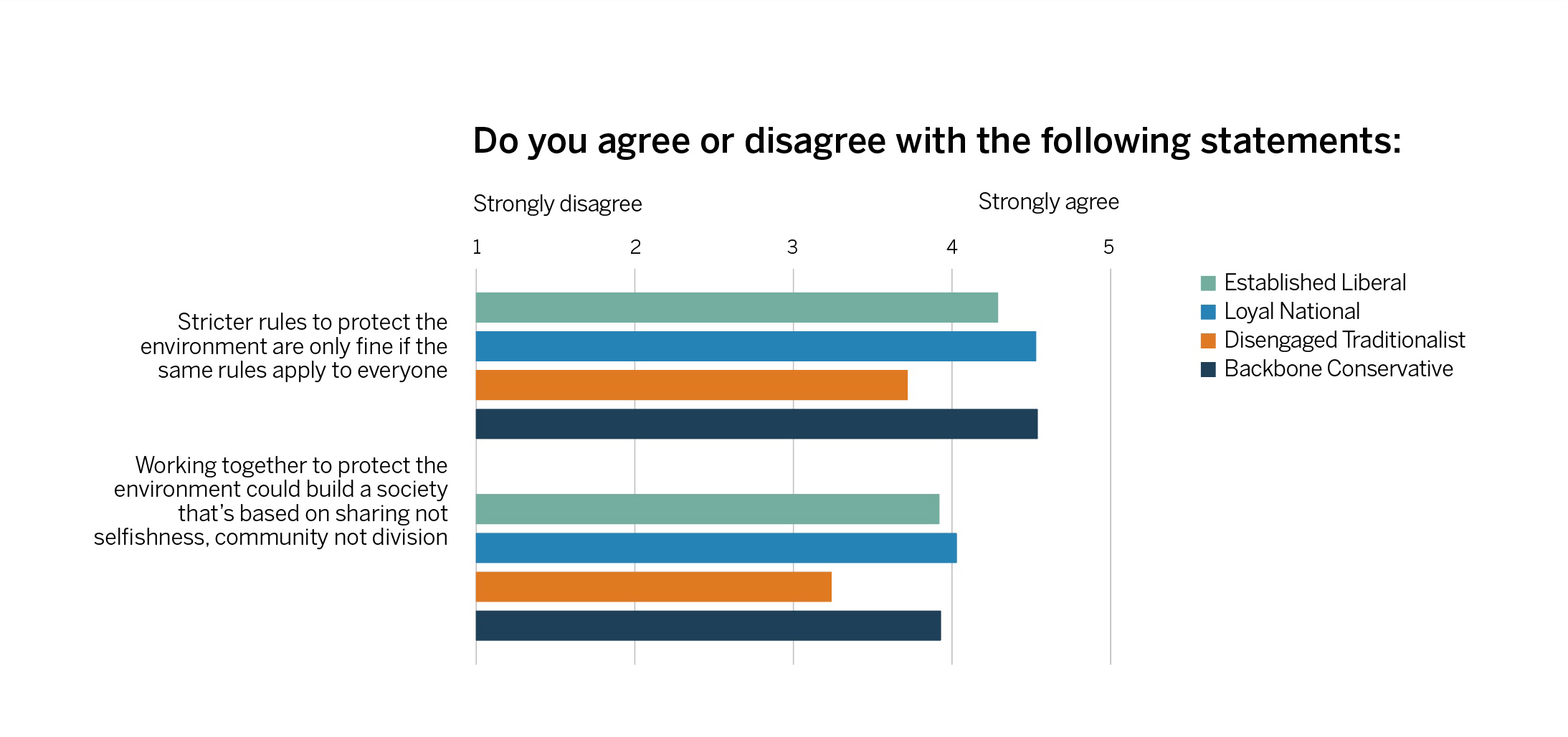
Loyal Nationals are closer to the higher income groups than Disengaged Traditionalists on complying with rules and working together for the environment
‘Yes’ and ‘no’ policies
Fairness – or more specifically perceived unfairness – is likely to be a big barrier for engaging with specific climate policies and actions: Loyal Nationals are the segment most likely to agree that a ban on petrol and diesel cars is unfair because it would add extra cost to daily life (70%, compared to 46% average).
I’m really annoyed about these green cars because I’m not necessarily poor, but I can’t afford them. All these new green things that they want people to do are just too expensive for ordinary people.”
61%
Support taxing flights
90%
Support food waste targets
83%
Support fines on excess packaging
27%
Support banning petrol cars
There is also strong opposition to taxing meat and dairy products. However, Loyal Nationals show strong support for policies such as implementing food waste targets in supermarkets, and fining brands that use excess packaging.
Perhaps driven by a sense of national pride, around 20% (the third highest) of Loyal Nationals say they would holiday in the UK to avoid a flight, once a year, and they are the most likely to say they have taken actions to improve their home insulation.
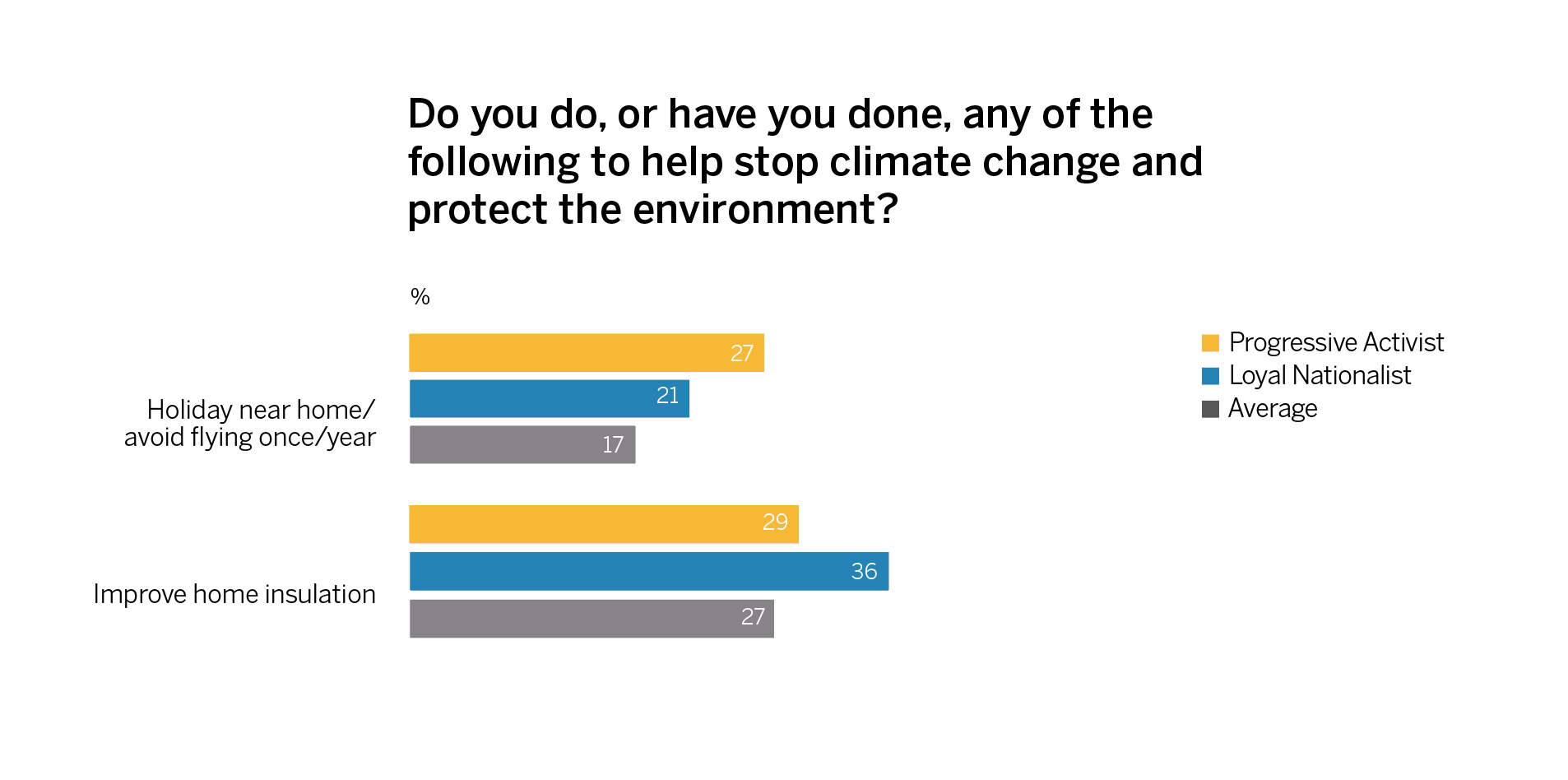
Loyal Nationals are more likely than average to holiday locally, and to improve home insulation
Loyal Nationals on Covid-19
I’ve really been rethinking my lifestyle. I think I’ve driven three times since March and I’m beginning to think that I’ve really come to enjoy the outdoors ... So, I’m really worried about what’s going to happen when society gets back to normal. What’s going to happen to the planet? It’s never, ever been my concern, but the fact that there were more birds around, that the air was cleaner, I’m really worried about are we going to get back to just, what? There was such a tangible difference made from there being no cars on the streets. Just the birds, the fauna, the flora. That has never worried me before, but now, the difference is that I think we can make a difference. Whereas before I thought it was theoretical, now I know it’s a reality.”
Loyal Nationals are more likely than the average (31%) to say that they are reassessing their priorities during lockdown (41%), and their agreement is as high as Progressive Activists and Civic Pragmatists on this statement: “If a business receives government support to get through the worst of this crisis, it should return the favour by signing up to new standards of behaviour. This means complying with tax laws, treating staff better, supporting local communities, and becoming more sustainable.”
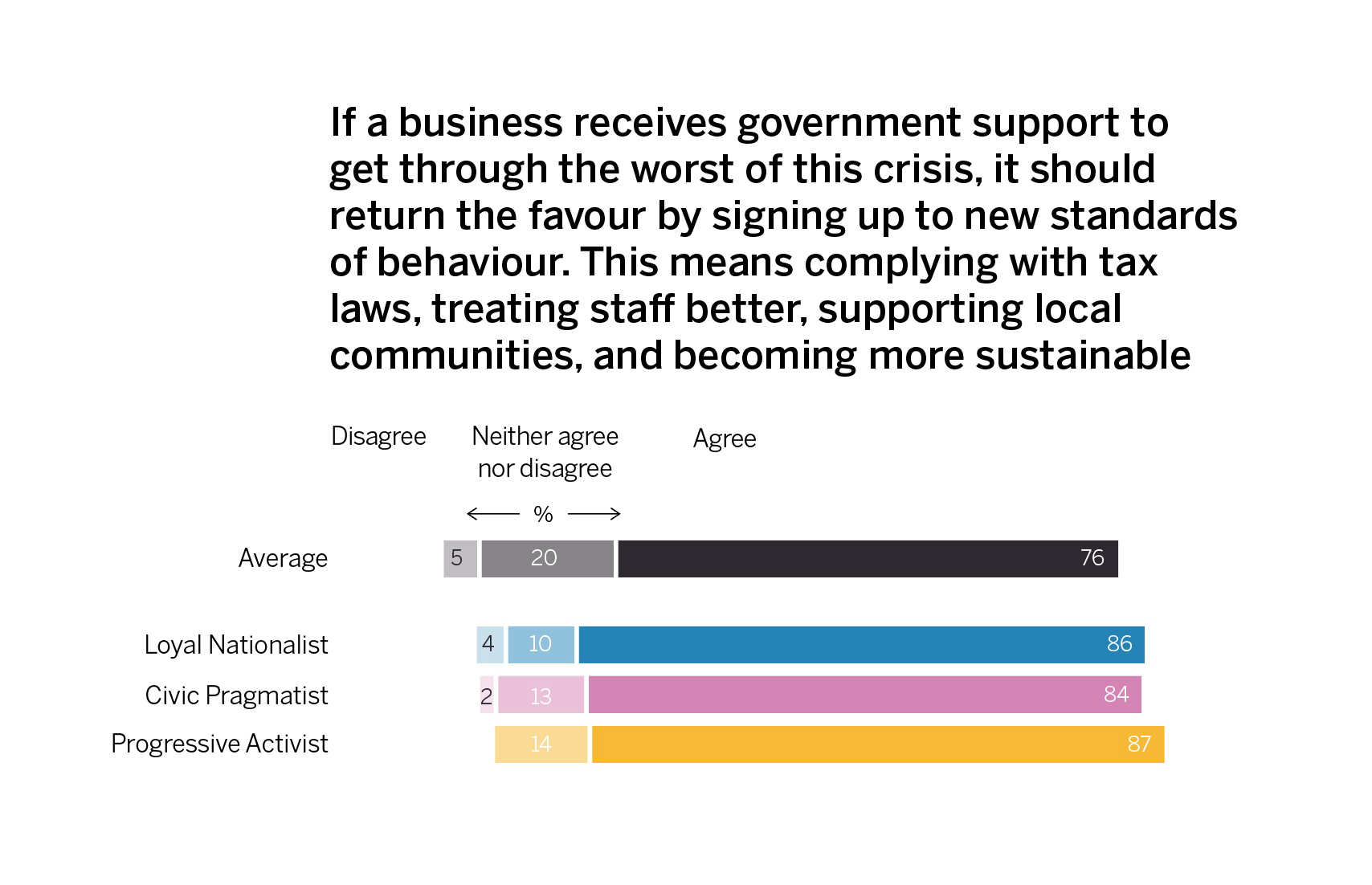
Loyal Nationals have higher than average agreement that businesses should ‘return the favour’ of government support by doing better
Loyal Nationals show less but still majority support for mandating that big businesses who receive bailouts must make changes to be more environmentally-friendly.
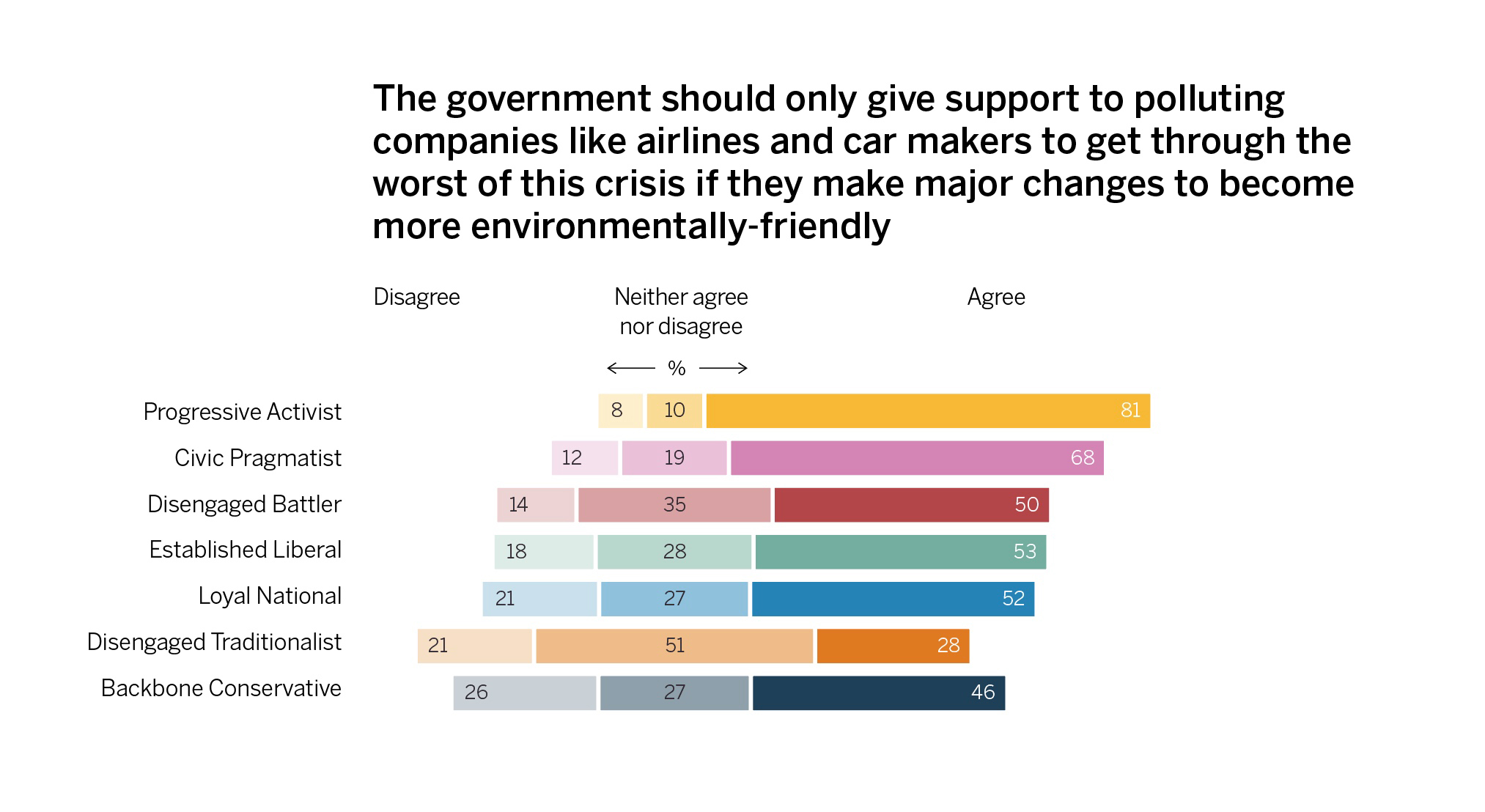
The majority of Loyal Nationals agree on conditional bailouts for big businesses
And, while their support for green recovery policies tends to be on par with more fiscally conservative groups such as Established Liberals and Backbone Conservatives, when the argument is made to reduce reliance on countries like China, Loyal Nationals show among the strongest support for investing in green industries across all segments.
NEW: Net zero
For Loyal Nationals, net zero and fairness tend to be seen through the lens of their feelings of victimisation and their fear of unfair treatment. They are pessimistic about the potential positive impacts of net zero on jobs, on the gap between rich and poor and on societal divisions.
Loyal Nationals are among the least knowledgeable about net zero, and yet, likely due to their distrust of political actors and elites, they are also the most likely to want a say in what changes and when. Their own cost of living is of utmost importance and they are fearful or wary of measures that will lead to them having to pay more. There is a risk that “net zero” will be seen as a top-down elite project that the average person will end up paying for.
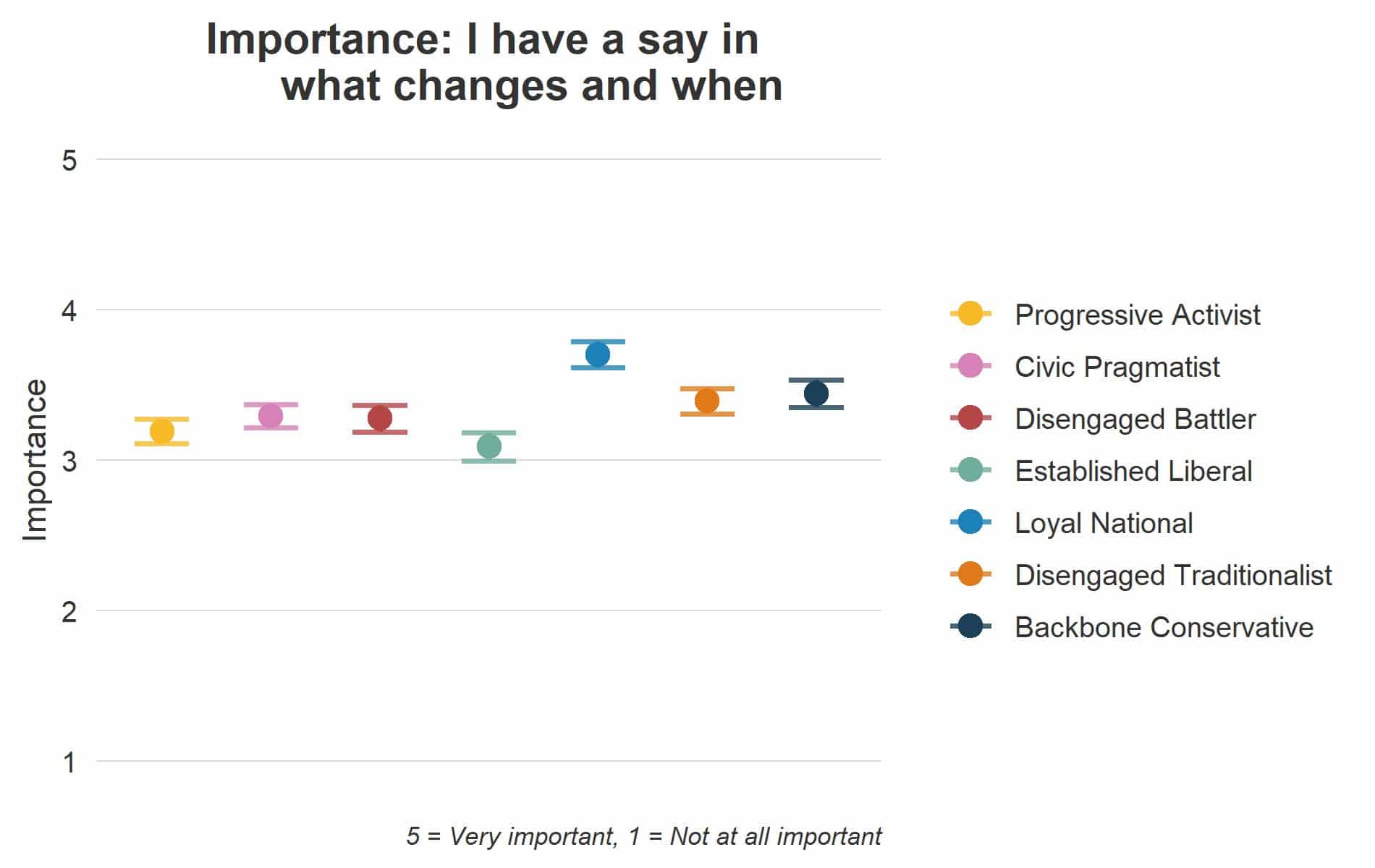
Importance of having a say in what changes and when in the UK reaching net zero, by segment. Data: Jan 2022.
Risk: Loyal Nationals may react badly to feeling they don’t have a say on net zero. Perceived hypocrisy and unfair treatment may lead to further erosion of trust.
Opportunity: Loyal Nationals may get behind a clearly communicated climate policy that symbolises a fair outcome for people like them.
Narrative recommendation: Policies around nature mitigating against the effects of climate change will reach Loyal Nationals and resonate with their view that the UK needs to be better prepared for the impacts of climate change.
Loyal Nationals have strong fairness concerns, expressed through a sense of injustice towards elites and big businesses setting one rule for themselves and another for the average person.
Well, really, I'm glass half-empty at the moment, so I can't see any fairness anywhere. I think since after Christmas, certain events, and especially in the media, what we're seeing with Partygate and all of it, I think I've just become so cynical and sceptical about it all, I don't think there is any fairness. I think it's dog eat dog and it's every man for himself. It might as well be the Hunger Games, I think, in some places. We're there.”
I said it's very hard when you look around to see much fairness anywhere. It doesn't matter. Everyone seems to be either having to pay more taxes, paying more for everything, and getting less.”
I don't think it was fair that people were getting 80% of their wage [on furlough] whilst I was working in the NHS and they're sat on their backsides doing nothing. To me, I was only getting 20%.”
Their views on what is fair in terms of household taxation or grants is scaled by income (taxing the rich is fair; government grants to the rich are unfair). However, they have a deep pessimism and anger towards elites taking advantage and making their own rules. For this reason, Loyal Nationals may be hesitant to endorse phrases such as “special rules for big emitters” because it reminds them of what they see as an unfair status quo in which elites are already setting “special rules” in their own interests.
A majority of Loyal Nationals think that the UK should be one of the most ambitious countries in the world when it comes to addressing climate change (55%), regardless of what other countries are doing, but a significant minority think that the UK should not take steps until other bigger countries do the same (36%). The “But China” argument arises with this segment, although most do not see it as a reason for the UK to slow down or stop its own efforts. Loyal Nationals are divided on whether each country should pay their own costs to cut carbon emissions (45%) or whether richer countries should help poorer and vulnerable countries adapt (47%).
In terms of net zero policies, Loyal Nationals show the highest support among the more right-leaning segments for low traffic neighbourhoods and are among the most likely to call for larger and heavier vehicles to pay above average vehicle taxes. Along with Backbone Conservatives, Loyal Nationals are most likely to say that the most expensive policies for the country are “switching from gas boilers to heat pumps” and “switching from petrol and diesel cars to electric vehicles”.
Loyal Nationals show openness towards some personal environmental actions. For instance, a sizable minority of Loyal Nationals are willing to reduce their meat consumption in some way (42%), compared to only 25% of Disengaged Traditionalists and 33% of Disengaged Battlers. Around 50% of Loyal Nationals would also endorse a flight tax on their second or third return flight.
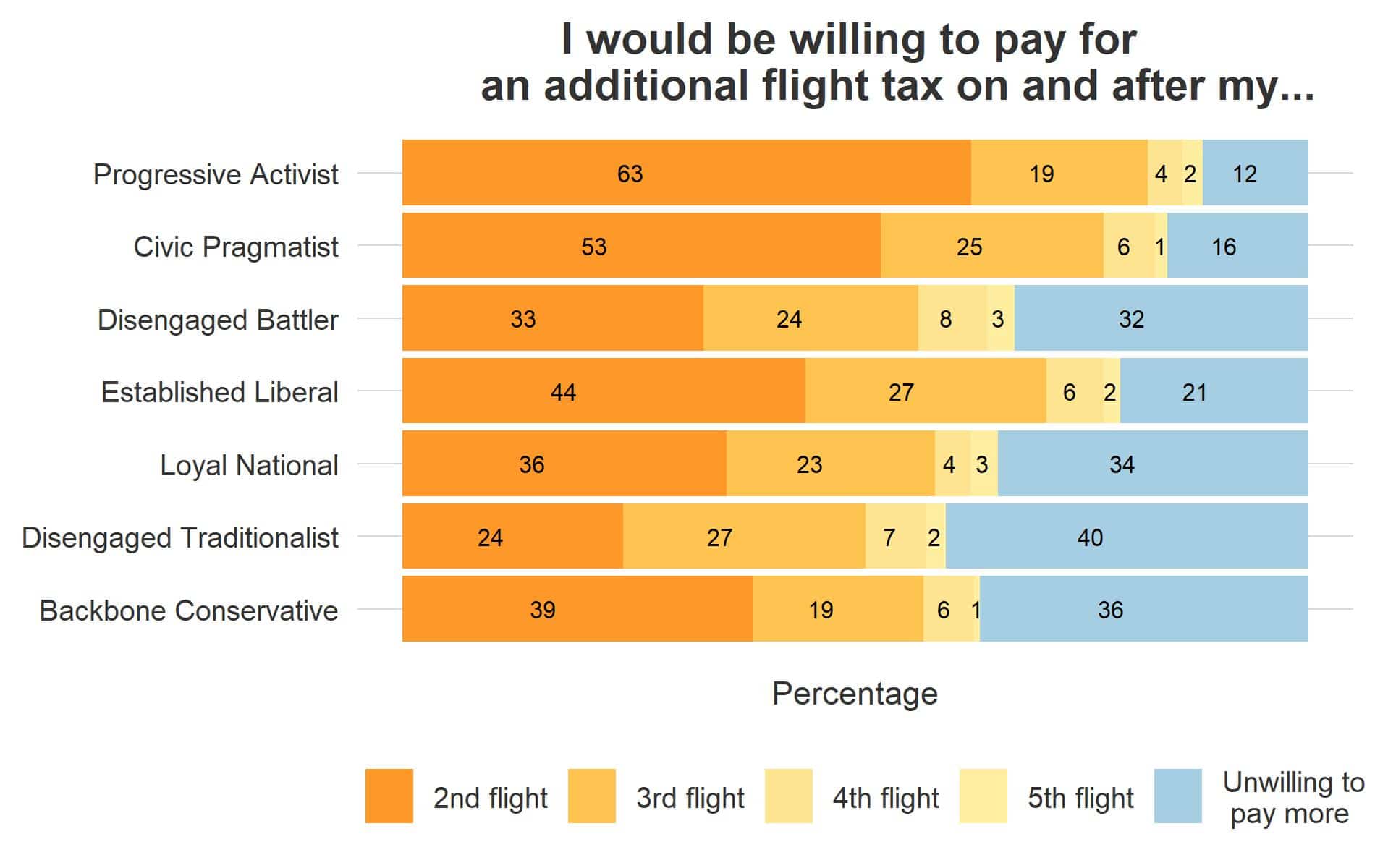
Willingness to pay an additional flight tax on or after a certain number of return flights per year by segment. Data: Jan 2022.
When it comes to more costly changes, such as replacing their gas boilers, Loyal Nationals judge themselves to be among the least likely to do so. Loyal Nationals who indicated that they are not likely to install a heat pump were most likely to cite reasons such as:
-
- heat pumps are more expensive than a gas boiler (51%)
- heat pumps would require too many other changes to their home (31%)
- heat pumps are an unknown and untrusted technology (28%)
Engaging Loyal Nationals
June 2022 update: see the results of our digital engagement work with Loyal Nationals, as part of our Climate Engagement Lab’s Innovation Partnership with Hope for the Future.
There is a clear case for building on the high level of climate concern among this segment, and their recognition of climate impacts already affecting the country – Loyal Nationals recognise climate change is ‘here and now’. Invoking national pride around British leadership on climate change, calling out heavy polluters, and emphasising the need for rules that apply to everyone are all powerful narratives for engaging this segment.
Key takeaways
Don’t feed fears of mass migration as a consequence of climate change
Loyal Nationals are highly focused on the perceived threats posed by immigration to society. But there is no justification for stoking these fears by suggesting that climate change specifically will increase the flow of migration into Britain, as there is no factual basis for this claim. In situations where climate change does play a role in migration, it tends to create internal migration (within a country) and is almost always driven by a number of complex factors.
Bring climate impacts ‘closer to home’
Loyal Nationals understand that climate change is linked to increasingly frequent and severe heat waves and flooding across Britain. Highlighting lived experiences of extreme weather is a crucial starting point for engaging this group.
Build on high levels of concern using trusted messengers
Barriers to this segment engaging further on climate change are social/cultural. They relate to their perceived disadvantage and lack of inclusion. Finding the right intermediaries is critical. Farmers, friends and family, and ordinary people affected by floods and fires score well on trust with this segment.
Make it local
It is important to prioritise the local and tangible ‘environment’ with Loyal Nationals. More green space and cleaner air are welcomed but are seen through the lens of cleaning up ‘neglected’ areas and looking after what we have, rather than the more abstract notion of ‘sustainability’.
Call out big polluters, who must play by the rules
Loyal Nationals are sensitive to people and institutions they see as not ‘playing by the rules’ and this includes corporate greenwashing. With high feelings of victimhood and a sense that some groups get better treatment than others, ‘calling out’ heavy polluters to ‘pay up’ is a good narrative for this segment.
Invoke national pride around British leadership
Like the Backbone Conservatives, Loyal Nationals want to hear about genuine success stories that suggest a positive place in the world for the country they are proud of: as the UK’s position as a global leader on offshore wind becomes increasingly clear, for example, there are opportunities to frame this as a source of patriotic pride.
Digital engagement
Between April-June 2022, Climate Outreach and Hope for the Future (HFTF) partnered to develop messaging to inspire Loyal Nationals to attend local, in-person events.
The slidedeck below summarises the results of this work:
- previous digital engagement work by HFTF with Loyal Nationals (see slides 3-13)
- research and bespoke analysis from Climate Outreach on how to engage Loyal Nationals (slides 14+).
The findings of the message development and testing will be published in due course.
Continue exploring
Sign up to our newsletter
Thank you for signing up to our newsletter
You should receive a welcome email shortly.
If you do not receive it, please check your spam folder, and mark as 'Not Spam' so our future newsletters go straight to your inbox.

